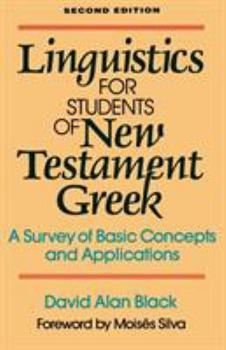Linguistics for Students of New Testament Greek: A Survey of Basic Concepts and Applications
Select Format
Select Condition 
Book Overview
Introduces Greek students to the field of linguistics and shows how its findings can increase their understanding of the New Testament. This description may be from another edition of this product.
Format:Paperback
Language:English
ISBN:0801020166
ISBN13:9780801020162
Release Date:August 2000
Publisher:Baker Academic
Length:236 Pages
Weight:1.30 lbs.
Dimensions:0.6" x 5.5" x 8.3"
Age Range:18 years and up
Grade Range:Postsecondary and higher
Related Subjects
Bible Study & Reference Christian Books & Bibles Commentaries Foreign Language Foreign Language Dictionaries & Thesauruses Foreign Language Fiction Foreign Language Learning Foreign Language Study Foreign Language Study & Reference Foreign Languages Instruction Language Arts Linguistics New Testament Reference Religion Religion & Spirituality Words, Language & GrammarCustomer Reviews
6 ratings
Not 2nd edition...
Published by Aaron S. , 3 years ago
The picture shows the 2nd edition (which is what I needed) but when mine arrived, it was the 1st edition. Disappointed in you guys.
good place to start
Published by Thriftbooks.com User , 15 years ago
for those who have had little trianing in linguistics as regards to greek nt it is a good place to start
Fascinating
Published by Thriftbooks.com User , 16 years ago
If you have any interest in understanding how language develops you should read this book. It's been fun to apply what I learned here as I listen to my four year-old daughter struggle with how to pronounce certain words and come up with the proper conjugations of irregular English verbs. Dr. Black makes an otherwise dry subject interesting.
Not bad (litotes--understatement)
Published by Thriftbooks.com User , 16 years ago
Black invites the reader to apply the techniques of modern linguistics to the analysis of New Testament Greek. This excellent general introduction covers the phonology, morphology, syntax, semantics and historical linguistics of koine Greek. It assumes no Greek or linguistics background. I give the chapter headings and some subheadings: 1. Introducing Linguistics: The Landscape and the Quest 2. Phonology: The Sound of Greek (Phonetics and Phonemics) 3. Morphology: The Anatomy of Greek Words 4. Syntax: The Architecture of the Greek Sentence 5. Semantics: Determining Meaning (The real jewel in this work--Word and Concept, Semantic Classes, Ambiguity, Denotation/Connotation, Idioms, Rhetorical Language, Semantic Change, Discourse Analysis) 6. Historial and Comparative Linguistics: The Biography of Greek In a Greek course I taught 2004/2005 based upon the Gospel of John (Beginning Greek: A Functional Approach) the class at one point wrestled with the disambiguation of a problematic participial phrase in John 1:9. ["He (Christ) was the true light that enlightens every man 'coming into the world.'"]. Should the phrase "coming into the word" go with "man" or "light"? Both are grammatically possible: the participle could be (1) accusative masculine singular or (2) nominative neuter singular. Do we use the proximity of "man" and "coming" to resolve the issue? Black explains (discourse analysis) that the larger context with its emphasis upon the incarnation of Christ (see 1:14) settles the issue (2). (However, this explanation is not altogether convincing. A comparison of similar statements by the same author (John) shows that he prefers the aorist, not [en] + participle. But such discussions would be beyond the scope of this work.) Highly recommended. Although it covers a lot of ground, the explanations are short and to the point and examples abound. A delightful 172 pages that would lay a great foundation for someone contemplating linguistics as a major or who wants to conscientously apply a knowledge of koine to NT interpretation.
Greek Linguistics
Published by Thriftbooks.com User , 17 years ago
For any serious NT Greek student, this book is very insightful to the many phonemic changes in the language. It is not a definitive book on lingustics, which the author himself claims, but, it does get you started in the area of linguistics that might give you some insight into the English language. Black writes in a way that doesn't overwhelm the student with his scholarship, which he definitely has, but he writes in a way that even someone who is a beginner in the study of the language can understand. I recommend it for any beginner or intermedeate student who would like to get a better handle on why some things change in the Greek language that may have confused you before.
Linguistics explains the secrets of New Testament Greek
Published by Thriftbooks.com User , 28 years ago
New Testament (Koine) Greek has long been taught as just another dead language. Black, an experienced teacher of Greek, changes the paradigm. Applying modern linguistic theory, Black shows how many of the so-called irregularities of Greek are actually normal and regular. The book covers the gamut: phonetics, morphology, syntax, semantics, etc. each section concludes with a short bibliography which can help students and teachers learn even more about linguistics and Koine Greek. An important text for newcomers and a useful review of Greek to sharpen rusty skills.






